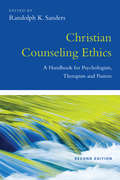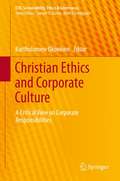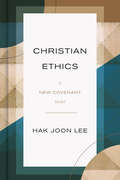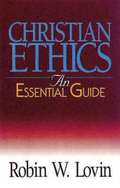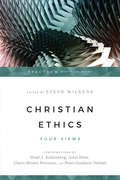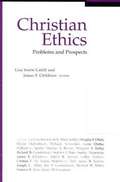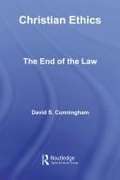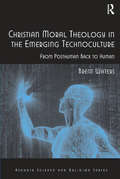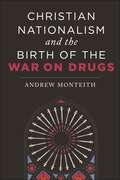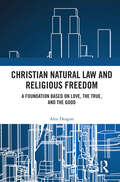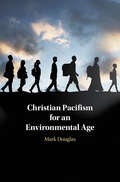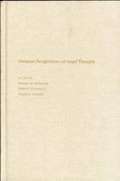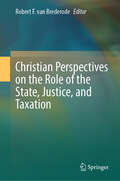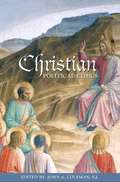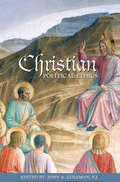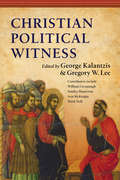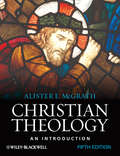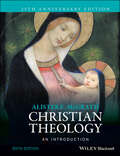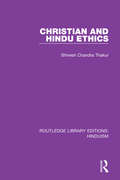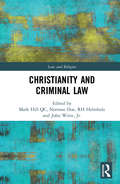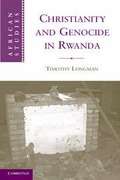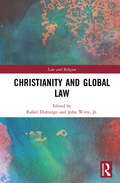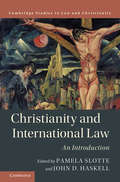- Table View
- List View
Christian Counseling Ethics: A Handbook for Psychologists, Therapists and Pastors (CAPS)
by Randolph K. Sanders"For the clients who see us in counseling . . . theological purity will make little difference if we do not practice with ethical integrity." Randolph K. Sanders, from chapter one The work of psychotherapy and counseling is full of ethical challenges and dilemmas. Responding to these situations with wisdom is critical, not only for the professional?s credibility, but also for good therapeutic relationships and positive treatment outcomes. Since its first publication, Christian Counseling Ethics has become a standard reference work for Christian psychologists, counselors and pastors and a key text at Christian universities and seminaries. This thoroughly revised edition retains core material on counseling ethics that has made it so valuable in a variety of settings. Now fully updated, it weighs and assesses new and emerging ethical issues in the field. For example, the current volume explores ethical issues involved in: • multiple relationships • confidentiality • documentation • therapist competence and character • addressing spiritual and value issues in therapy • teletherapy • individual and couples therapy • counseling with minors • psychological first aid after disasters • counseling crossculturally In addition, the book considers dilemmas Christian therapists face in specific settings such as: • church-based counseling centers • government and military institutions • missions organizations • college counseling centers Psychologist Randolph Sanders has assembled a distinguished team of clinicians and academicians to address the issues. They include W. Brad Johnson, Alan Tjeltveit, Everett Worthington, Sally Schwer Canning, Siang-Yang Tan, Tamara Anderson, Stanton Jones, Jennifer Ripley, Angela Sabates, Mark Yarhouse, Richard Butman and Cynthia Eriksson.
Christian Ethics and Corporate Culture: A Critical View on Corporate Responsibilities (CSR, Sustainability, Ethics & Governance)
by Bartholomew OkonkwoThe essays collected in this book discuss the contemporary practice of corporate responsibility by applying the Christian principles of the unity of knowledge and pursuit of truth to the traditional principles of justice, human dignity and the common good, to rediscover a corporate culture that will help transform our economic system and the characteristics required to build an enduring trust in economic relationships. In this volume a select group of management theorists, theologians, legal scholars, economists and ethicists jointly strive to give back to the market economy its ethical and political dimensions. They assess the quality of present day corporate social responsibility, discuss the social and environmental costs of production and argue for an agenda that can be used in modern corporations in their effort to align profitability and growth with business ethics.
Christian Ethics: A New Covenant Model
by Hak Joon LeeIn this capacious and accessible introduction to Christian ethics, Hak Joon Lee advances a renewed vision of Christian life that is liberative, grace-centered, and justice- and peace-oriented in nature. Responding to key ethical questions of today, Lee applies the moral meaning and implications of the New Covenant in Jesus Christ to twenty-first-century life, characterized by fluidity, fragmentation, division, and violence. Christian Ethics begins by introducing covenant as the central drama and storyline of Scripture that culminates in the New Covenant of Jesus. It presents shalom (the wholeness and flourishing of creation) as God&’s ultimate purpose and God&’s covenant as &“God&’s organizing mechanism of community&” that mediates God&’s work of liberation and restoration. Lee proposes a creative model of Christian ethics based on the New Covenant of Jesus and its organizing patterns, reconstructing the key categories of ethics (agency, norms, authority of Scripture, ethical discernment, etc.) and drawing out four practices—communicative engagement, just peacemaking, grassroots organizing, and nonviolence. The result is a new model of Christian ethics that is inclusive, egalitarian, ecological, and justice- and peace-oriented, which overcomes the limitations of traditional covenantal ethics. In the second part of the book, Lee systematically applies New Covenant ethics to the most urgent and controversial social issues of our time: democratic politics, economic ethics, creation care, criminal justice, race, sex and marriage, medicine, and war and peace. Through his deep, pastoral, and irenic inquiries into these difficult topics, Lee demonstrates a pattern of covenantal moral reasoning that undercuts the dominant neoliberal ethos of individualism and transactional relationship that more and more influences Christian moral decisions. His conclusion is that as covenant has been at the heart of modern democracy, human rights, civil society, and civic formation, a renewed understanding of covenant centered in Jesus can help to heal our broken society and imperiled planet, and to reorganize the fragmented human life in the era of globalization and digitization.
Christian Ethics: An Essential Guide (New Studies In Christian Ethics Ser. #20)
by Robin W. LovinIn this excellent outline of Christian ethics, Robin W. Lovin achieves a balance between the questions and issues which form the core of the study of ethics and the life situations from which those questions arise. Eschewing a sectarian approach which dismisses other understandings of the moral life, Lovin nonetheless lays claim to a specifically Christian understanding of ethics. He begins with basic Christian convictions about the reality of God and human redemption and weaves these convictions into the fabric of moral concerns that are widely shared in contemporary society. He takes note of the problems that arise when Christians try to act on or enforce their convictions in a pluralistic society and recognizes the variety of theological and moral beliefs that are held within the Christian community, as well as in the wider society.
Christian Ethics: Four Views (Spectrum Multiview Book Series)
by Steve WilkensChristian Ethics: Four ViewsBrad J. Kallenberg: Virtue EthicsJohn Hare: Divine Command EthicsClaire Peterson: Natural Law EthicsPeter Heltzel: Prophetic EthicsChristian Ethics: Four Views
Christian Ethics: Problems and Prospects
by Lisa S. Cahill James F. ChildressThis fresh analysis of the "state of the question" in religious ethics charts the course for future study and exploration in the field. Written in honor of James Gustafson, who provides a conclusion, these 22 original and tightly argued essays examine hotly debated controversies on a wide range of topics, from sources of theological ethics to the moral life. At the core of these complementary perspectives is the ever-increasing tension between the particularity of religious and philosophical traditions and the universality of moral discourse. Designed for classroom use.
Christian Ethics: The End of the Law
by David S. CunninghamChristian Ethics provides a biblical, historical, philosophical and theological guide to the field of Christian ethics. Prominent theologian David S. Cunningham explores the tradition of 'virtue ethics' in this creative and lively text, which includes literary and musical references as well as key contemporary theological texts and figures. Three parts examine: the nature of human action and the people of God as the 'interpretative community' within which ethical discourse arises the development of a 'virtue ethics' approach, and places this in its Christian context significant issues in contemporary Christian ethics, including the ethics of business and economics, politics, the environment, medicine and sex. This is the essential text for students of all ethics courses in theology, religious studies and philosophy.
Christian Law
by Norman DoeChristian Law: Contemporary Principles offers a detailed comparison of the laws of churches across ten distinct Christian traditions worldwide: Catholic, Orthodox, Anglican, Lutheran, Methodist, Reformed, Presbyterian, United, Congregational and Baptist. From this comparison, Professor Doe proposes that all denominations of the faith share common principles in spite of their doctrinal divisions; and that these principles reveal a concept of 'Christian law' and contribute to a theological understanding of global Christian identity. Adopting a unique interdisciplinary approach, the book provides comprehensive coverage on the sources and purposes of church law, the faithful (lay and ordained), the institutions of church governance, discipline and dispute resolution, doctrine and worship, the rites of passage, ecumenism, property and finance, as well as church, state and society. This is an invaluable resource for lawyers and theologians who are engaged in ecumenical and interfaith dialogue, showing how dogmas may divide but laws link Christians across traditions.
Christian Moral Theology in the Emerging Technoculture: From Posthuman Back to Human (Routledge Science and Religion Series)
by Brent WatersWe are living in an emerging technoculture. Machines and gadgets not only weave the fabric of daily life, but more importantly embody philosophical and religious values which shape the contemporary moral vision-a vision that is often at odds with Christian convictions. This book critically examines those values, and offers a framework for how Christian moral theology should be formed and lived-out within the emerging technoculture. Brent Waters argues that technology represents the principal cultural background against which contemporary Christian moral life is formed. Addressing contemporary ethical and religious issues, this book will be of particular interest to students and scholars exploring the ideas of Heidegger, Nietzsche, Grant, Arendt, and Borgmann.
Christian Nationalism and the Birth of the War on Drugs
by Andrew MonteithRecovers the religious origins of the War on DrugsMany people view the War on Drugs as a contemporary phenomenon invented by the Nixon administration. But as this new book shows, the conflict actually began more than a century before, when American Protestants began the temperance movement and linked drug use with immorality.Christian Nationalism and the Birth of the War on Drugs argues that this early drug war was deeply rooted in Christian impulses. While many scholars understand Prohibition to have been a Protestant undertaking, it is considerably less common to consider the War on Drugs this way, in part because racism has understandably been the focal point of discussions of the drug war. Antidrug activists expressed—and still do express--blatant white supremacist and nativist motives. Yet this book argues that that racism was intertwined with religious impulses. Reformers pursued the “civilizing mission,” a wide-ranging project that sought to protect “child races” from harmful influences while remodeling their cultures to look like Europe and the United States. Most reformers saw Christianity as essential to civilization and missionaries felt that banning drugs would encourage religious conversion and progress. This compelling work of scholarship radically reshapes our understanding of one of the longest and most damaging conflicts in modern American history, making the case that we cannot understand the War on Drugs unless we understand its religious origins.
Christian Natural Law and Religious Freedom: A Foundation Based on Love, the True, and the Good
by Alex DeagonDeagon addresses the need for a robust theoretical foundation for religious freedom that accounts for its transcendent nature.What is the idea of religious freedom? Where does it come from? Why should it be protected? These important questions for understanding religious freedom are usually addressed through secular and immanent foundations which are unable to sufficiently grapple with the religious nature of religious freedom – its connection with the divine. Deagon proposes an alternative approach rooted in Christian Natural Law. In Part I of the book, Deagon defines and develops Christian Natural Law, identifying three consistent themes: Love, the True and the Good. In Part II, Deagon deploys Christian Natural Law to articulate a theological framework for religious freedom which shows that religious freedom is an individual and social good, is oriented to the true and is grounded in love. In doing so, Deagon offers a new foundation for religious freedom which properly considers it as a matter of both human and divine action.This book will be of interest to those engaged in law and religion studies, in particular scholars of religious freedom, theology and jurisprudence and human rights.
Christian Pacifism for an Environmental Age
by Mark DouglasIn this volume, Mark Douglas offers a new vision of the history of Christian pacifism within the context of a warming world. He narrates this story in a way that recognizes the complexities of the tradition and aligns it with a coherent theological vision, one that shapes the tradition to encompass the new causes and types of wars fought during the Anthropocene. Along the way, Douglas draws from research in historical climatology to recover the overlooked role that climate changes have always played in shaping not only the Christian pacifist tradition but also the movement of traditions through western history. Scholars across a range of disciplines - peace studies, Christian theology and history, environmentalism, and environmental conflict studies - will benefit from this model of critical and charitable engagement with the complex history of Christian pacifism, the resources of which will be important for addressing wars in a warming world.
Christian Perspectives on Legal Thought
by Michael W. Mcconnell Robert F. Cochran Angela C. CarmellaDifferent American legal scholars have joined together to produce 'Christian Perspectives On Legal Thought', a book that views legal thought from various Christian perspectives.
Christian Perspectives on the Role of the State, Justice, and Taxation
by Robert F. van BrederodeThis book, Christian Perspectives on the Role of the State, Justice, and Taxation, examines the historical and ongoing influence of Christian ethical thought on taxation, governance, and distributive justice. Building on themes introduced in Political Philosophy and Taxation (Springer, 2022), which focused on secular perspectives, this sequel shifts attention to the contributions of Christian thinkers from Medieval times to the present. The book explores key questions surrounding the role of the state, the relationship between the state and its subjects, the moral right to tax, and what constitutes fairness in taxation. It investigates how Christian ethical teachings have shaped Western political philosophy, particularly in the context of distributive justice, and evaluates their relevance in contemporary discussions. By analyzing the intersection of theology, ethics, and political philosophy, this book provides a deeper understanding of how Christian traditions have influenced historical notions of justice, fairness, and governance. It offers insights into how these principles can inform modern policy debates and ethical considerations in taxation. This book serves as a valuable resource for scholars, students, and professionals interested in religious ethics, political philosophy, and public policy. It invites readers to reflect on the enduring impact of Christian thought on concepts of justice and the responsibilities of the state.
Christian Political Ethics
by John A. ColemanChristian Political Ethics brings together leading Christian scholars of diverse theological and ethical perspectives- Catholic, Lutheran, Calvinist, and Anabaptist- to address fundamental questions of state and civil society, international law and relations, the role of the nation, and issues of violence and its containment. Representing a unique fusion of faith-centered ethics and social science, the contributors bring into dialogue their own varying Christian understandings with a range of both secular ethical thought and other religious viewpoints from Judaism, Islam, and Confucianism. They explore divergent Christian views of state and society- and the limits of each. They grapple with the tensions that can arise within Christianity over questions of patriotism, civic duty, and loyalty to one's nation, and they examine Christian responses to pluralism and relativism, globalization, and war and peace. Revealing the striking pluralism inherent to Christianity itself, this pioneering volume recasts the meanings of Christian citizenship and civic responsibility, and raises compelling new questions about civil disobedience, global justice, and Christian justifications for waging war as well as spreading world peace. It brings Christian political ethics out of the churches and seminaries to engage with today's most vexing and complex social issues.
Christian Political Ethics (Ethikon Series in Comparative Ethics)
by John A. ColemanChristian Political Ethics brings together leading Christian scholars of diverse theological and ethical perspectives--Catholic, Lutheran, Calvinist, and Anabaptist--to address fundamental questions of state and civil society, international law and relations, the role of the nation, and issues of violence and its containment. Representing a unique fusion of faith-centered ethics and social science, the contributors bring into dialogue their own varying Christian understandings with a range of both secular ethical thought and other religious viewpoints from Judaism, Islam, and Confucianism. They explore divergent Christian views of state and society--and the limits of each. They grapple with the tensions that can arise within Christianity over questions of patriotism, civic duty, and loyalty to one's nation, and they examine Christian responses to pluralism and relativism, globalization, and war and peace. Revealing the striking pluralism inherent to Christianity itself, this pioneering volume recasts the meanings of Christian citizenship and civic responsibility, and raises compelling new questions about civil disobedience, global justice, and Christian justifications for waging war as well as spreading world peace. It brings Christian political ethics out of the churches and seminaries to engage with today's most vexing and complex social issues. The contributors are Michael Banner, Nigel Biggar, Joseph Boyle, Michael G. Cartwright, John A. Coleman, S.J., John Finnis, Theodore J. Koontz, David Little, Richard B. Miller, James W. Skillen, and Max L. Stackhouse.
Christian Political Witness (Wheaton Theology Conference Series)
by Gregory W. Lee George KalantzisContributors include:Stanley HauerwasMark NollScot McKnightTimothy G. GombisGeorge KalantzisJana Marguerite BennettWilliam T. CavanaughPeter J. LeithartDaniel M. Bell Jr.Jennifer M. McBrideDavid P. GusheeBishop David Gitari
Christian Theology
by Alister E. McgrathAlister McGrath's Christian Theology: An Introduction is one of the most internationally-acclaimed and popular Christian theology textbooks in use today. This 5th edition has been completely revised, and now features new and extended material, numerous additional illustrations, and companion resources, ensuring it retains its reputation as the ideal introduction to Christian theology.Fully updated 5th edition of the bestselling textbook, incorporating expanded material, numerous student features and new illustrations Features new sections on Copernicanism and Darwinism Includes extended discussions of Augustine's doctrine of creation, Trinitarian theologies of religion, and the relation of Christianity to other faiths May be used as a stand-alone volume, or alongside the Christian Theology Reader, 4th edition for a complete overview of the subject Retains the chapter structure of the 4th edition, ensuring comparability with earlier editions and courses based on these Accompanied by a revised instructor's website featuring expanded resources including study questions and answers; visit www.wiley.com/go/mcgrath for more details and to register for access
Christian Theology: An Introduction (Coursesmart Ser.)
by Alister E. McGrathCHRISTIAN THEOLOGY “The genius of Alister E. McGrath is his remarkable ability to write in a clear, concise, and lucid manner that draws both teachers and students to participate with the great thinkers of the Christian tradition, past and present. Education and illumination are the abundant fruits of this massive, well-organized text, which is sure to appeal to a wide range of Protestant, Catholic, and Orthodox audiences. For this we are indebted to the author.” Dennis Ngien, Professor of Systematic Theology, Tyndale University College and Seminary, Toronto, Canada “For sheer comprehensiveness, clarity, and coherence, Alister McGrath has produced the definitive textbook. Always accurate and engaging, students are gently introduced to the gift of Theology in a memorable way.” Ian S. Markham, Dean and President of Virginia Theological Seminary Praise for the fifth edition “Alister McGrath has proven himself a master at engagingly and simply introducing Christian theology in all of its contested complexity. All who work at the critical appropriation of the theological tradition stand in debt to McGrath.” M. Douglas Meeks, Cal Turner Chancellor Professor of Theology and Wesleyan Studies, Vanderbilt University Divinity School Now celebrating its 25th year of publication, Christian Theology is one of the most internationally acclaimed textbooks in this area today. Completely rewritten for the sixth edition, it remains the ideal introduction to the beliefs and interpretation of Christianity. It is specifically designed for students with no prior knowledge, presenting the primary themes and debates of Christian theology with clarity and historical context. This new edition retains all the elements that have made it so successful while also including significant additions and developments. There is an increased discussion of contemporary theology to complement the excellent coverage of historical material. Important new information has also been added, in areas such as the Holy Spirit, contemporary non-Western theologies, and feminist voices in Christian theology. The text is rich in pedagogy to encourage student learning, featuring a two colour design, glossary, end-of-chapter discussion questions, and much more. Written by renowned theologian Alister E. McGrath, this classic text is a clear, lively and concise introduction that provides instructors with the tools they need to engage with their students on Christian theology.
Christian and Hindu Ethics (Routledge Library Editions: Hinduism #1)
by Shivesh Chandra ThakurHinduism and Christianity are different in structure and approach – but have a great deal in common in matters relating to ethics. This book, first published in 1969, is the first systematic and detailed work which attempts to bring out both the differences and similarities. The author selects some of the fundamental problems of philosophical ethics, such as the moral law – its authority and sources, moral effort and human freedom, moral failure and responsibility – and explores the respective answers of Hinduism and Christianity.
Christianity and Criminal Law (Law and Religion)
by John Witte Jr Norman Doe Mark Hill Qc Rh HelmholzThis collection, by leading legal scholars, judges and practitioners, together with theologians and church historians, presents historical, theological, philosophical and legal perspectives on Christianity and criminal law. Following a Preface by Lord Judge, formerly Lord Chief Justice of England and Wales, and an introductory chapter, the book is divided into four thematic sections. Part I addresses the historical contributions of Christianity to criminal law drawing on biblical sources, early church fathers and canonists, as far as the Enlightenment. Part II, titled Christianity and the principles of criminal law, compares crime and sin, examines concepts of mens rea and intention, and considers the virtue of due process within criminal justice. Part III looks at Christianity and criminal offences, considering their Christian origins and continuing relevance for several basic crimes that every legal system prohibits. Finally, in Part IV, the authors consider Christianity and the enforcement of criminal law, looking at defences, punishment and forgiveness. The book will be an invaluable resource for students and academics working in the areas of Law and Religion, Legal Philosophy and Theology.
Christianity and Freedom Volume 2. Contemporary Perspectives ( Law and Christianity)
by Allen D. Hertzke Timothy Samuel ShahVolume 2 of Christianity and Freedom illuminates how Christian minorities and transnational Christian networks contribute to the freedom and flourishing of societies across the globe, even amidst pressure and violent persecution. Featuring unprecedented field research by some of the world's most distinguished scholars, it documents the outsized role of Christians in promoting human rights and religious freedom; fighting injustice; stimulating economic equality; providing education, social services, and health care; and nurturing democratic civil society. Readers will come away surprised and sobered to learn how this very Christian link to freedom often invites persecution. What are the dimensions of persecution and how are Christians responding to that pressure? What resources - theological, social, or transnational - do they marshal in leavening their societies? What will be lost if the Christian presence is marginalized? The answers to these questions are of crucial relevance in a world awash with religious extremism and deepening instability. Gathers top scholarship on Christianity and human rights. Corrects prevailing misconceptions of the historical development of liberal freedoms. Shows how a profound theological idea propelled innovations in human history.
Christianity and Genocide in Rwanda
by Timothy LongmanAlthough Rwanda is among the most Christian countries in Africa, in the 1994 genocide, church buildings became the primary killing grounds. To explain why so many Christians participated in the violence, this book looks at the history of Christian engagement in Rwanda and then turns to a rich body of original national and local-level research to argue that Rwanda's churches have consistently allied themselves with the state and played ethnic politics. Comparing two local Presbyterian parishes in Kibuye prior to the genocide demonstrates that progressive forces were seeking to democratize the churches. Just as Hutu politicians used the genocide of Tutsi to assert political power and crush democratic reform, church leaders supported the genocide to secure their own power. The fact that Christianity inspired some Rwandans to oppose the genocide demonstrates that opposition by the churches was possible and might have hindered the violence.
Christianity and Global Law (Law and Religion)
by John Witte Jr. Rafael DomingoThis book explores both historical and contemporary Christian sources and dimensions of global law and includes critical perspectives from various religious and philosophical traditions. Two dozen leading scholars discuss the constituent principles of this new global legal order historically, comparatively, and currently. The first part uses a historical-biographical approach to study a few of the major Christian architects of global law and transnational legal theory, from St. Paul to Jacques Maritain. The second part distills the deep Christian sources and dimensions of the main principles of global law, historically and today, separating out the distinct Catholic, Protestant, and Orthodox Christian contributions as appropriate. Finally, the authors address a number of pressing global issues and challenges, where a Christian-informed legal perspective can and should have deep purchase and influence. The work makes no claim that Christianity is the only historical shaper of global law, nor that it should monopolize the theory and practice of global law today. But the book does insist that Christianity, as one of the world’s great religions, has deep norms and practices, ideas and institutions, prophets and procedures that can be of benefit as the world struggles to find global legal resources to confront humanity’s greatest challenges. The volume will be an essential resource for academics and researchers working in the areas of law and religion, transnational law, legal philosophy, and legal history.
Christianity and International Law: An Introduction (Law and Christianity)
by Pamela Slotte John D. HaskellThis cross-disciplinary collaboration offers historical and contemporary scholarship exploring the interface of Christianity and international law. Christianity and International Law aims to understand and move past arguments, narratives and tropes that commonly frame law-religion studies in global governance. Readers are introduced to a range of confessional and critical perspectives explicitly engaging a diverse range of methodological and theoretical orientations to rethink how we experience and find ourselves caught within the phenomena of Christianity and international law.
